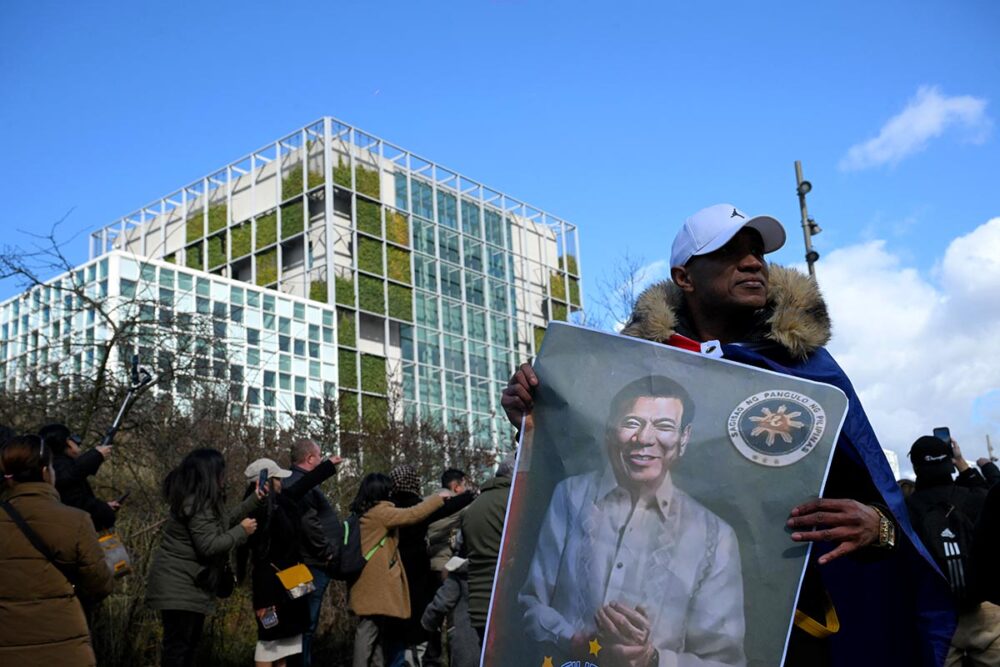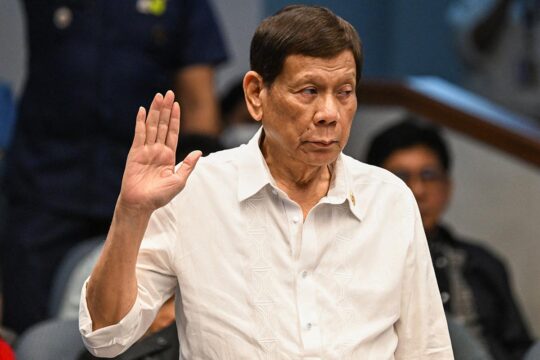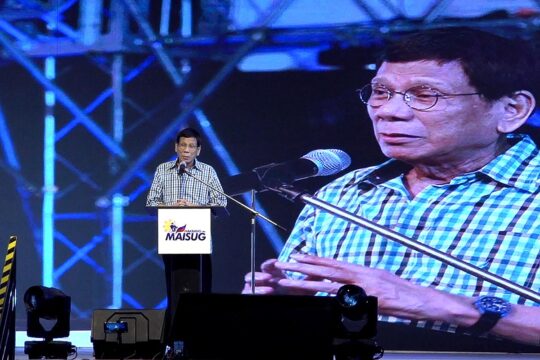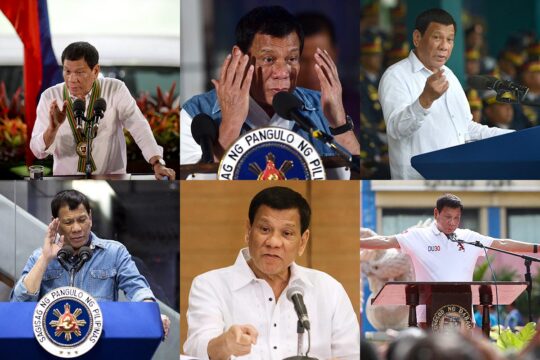If you think the International Criminal Court’s case against Rodrigo Duterte is just about law, you’re missing the bigger picture. In Manila, the trial lands right in the middle of a recalibrated power game between probably the countries two most powerful families: Marcos vs. Duterte, which breaks down further into Washington vs. Beijing, and victims seeking justice vs. institutions brittle from years of impunity. The question isn’t only whether The Hague can convict an 80-year-old ex-president – his guilt is hardly contested. It’s whether this process strengthens Philippine democracy—or, perversely, hardens the very forces it aims to check.
With hearings scheduled to start on the 23rd September, following March’s arrest and detention of Duterte, this is now delayed under the grounds of the accused’s ill health. Following the hearings which will establish if there is sufficient evidence to support the charges, the trial may begin. However, ICC trials are measured in years rather than months and nobody should be expecting a verdict inside 4 years, based on ICC history.
Duterte was arrested in Manila on 11 March 2025 on an ICC warrant over killings in the “war on drugs” and swiftly transferred to The Hague. The Pre-Trial Chamber has weighed (and prosecutors have argued) that releasing him would risk intimidation of witnesses. These are not abstractions: families of victims report coordinated harassment campaigns since his arrest.
President Ferdinand Marcos Jr. has zig-zagged: publicly insisting the ICC lacks authority and that the Philippines won’t “cooperate” yet allowing processes through Interpol channels that resulted in Duterte’s custody—and later defending the transfer in the Senate. It’s lawyerly hair-splitting, but the political message was clear: the Palace would not throw itself on the tracks for the former president. The political calculus changed for Marcos. Where once Marcos protected Duterte, whose daughter Sara is the Vice-President no less, the two family’s marriage of convenience is well and truly over. Sara has thus far survived attempts to oust her on corruption charges or the fact she openly threatened President Marcos and others with assassination.
The risk of justice delegitimised
But will the trial deliver justice for victims? It can—partly. The ICC can establish an authoritative record, give victims standing, and narrow the space for revisionism. But its limits are real and familiar: slow timelines, a thin conviction record, and dependence on states that may change their minds. Even supporters concede the court’s throughput is glacial. For Filipinos, justice delayed risks being justice delegitimised.
Meanwhile, the perpetrators who operationalised the bloodshed are not, for the most part, in the dock. Some still sit in power. Senator Ronald “Bato” dela Rosa—the police chief who helped architect the campaign—remains a central player and has used his platform to shield the Duterte camp. Senator Bong Go is another Duterte acolyte that should be on trial too. This is precisely why victims and prosecutors warn about witness tampering and intimidation: the networks endure.
Witnesses have been disclosed now, they are in danger, they will need to be protected by someone. And yet—here’s the uncomfortable bit—the trial might also embolden the Dutertes. Sara Duterte has weathered an impeachment push, navigated budget scrutiny, and still posts stronger trust numbers than the president. In the midterms, Duterte-aligned forces performed well enough to keep her 2028 presidential path open. Her father’s trial will likely not be over by the time the family takes over the Palace – then what? For many supporters, the ICC case confirms a pre-baked narrative: a Western court meddling to kneecap a popular clan. That grievance politics is potent, and it travels.
Layer on the geopolitics and the picture sharpens. Manila’s pivot back to Washington—Enhanced Defence Cooperation Agreement (US military sites), record-scale (US military) Balikatan exercise, joint patrols – has accelerated in the disputed South China Sea. Beijing’s coercion, and even alleged information operations around the 2025 polls, give the Marcos camp reasons to hug the alliance tighter. In that climate, it’s easy for Duterte partisans to cast the ICC as another Western cudgel. It isn’t—but the optics are a political gift.
Make it a Filipino justice effort
So, is this a “show trial” for Western interests? No—the charges arise from years of documentation by Filipino groups and international investigators. But can the process be weaponised as a talking point by the Duterte camp? Absolutely. The remedy is not to abandon the case; it is to couple it with a credible domestic justice agenda that narrows the space for manipulation and delivery local domestic accountability for those that actually did the killing or were closer in the kill chain.
That means three things. First, protect the living record: fund and fortify witness protection, including digital-security support for families under online attack. Philippine authorities should treat harassment campaigns as criminal, not “political noise,” and move swiftly on National Bureau of Investigations probes.
Second, clean house at home: vet and suspend officers credibly linked to extra judicial killing patterns, even if they now wear different hats. The signal to victims must be that impunity doesn’t pay—whether or not a Hague conviction lands.
Third, put victims at the centre: support the ICC’s Office of Public Counsel for Victims and civil-society accompaniment so survivors aren’t carrying this alone. If the trial feels like a remote spectacle, public confidence will collapse.
Will the ICC weaken Filipino institutions? Only if Filipinos let it become the substitute for domestic accountability. The smarter play is complementarity: use the international case as leverage to rebuild the rule of law at home. If Manila pairs a sober, sovereign reform agenda with cooperation on truth-telling and protection, the Hague proceedings can stiffen—not hollow—our institutions. If not, the trial risks hardening a siege mentality and super-charging Sara Duterte’s presidential run that may scupper everything being attempted in the Hague.
Justice should have been a Filipino fight. It still can be—but not without a brave and concerted effort.
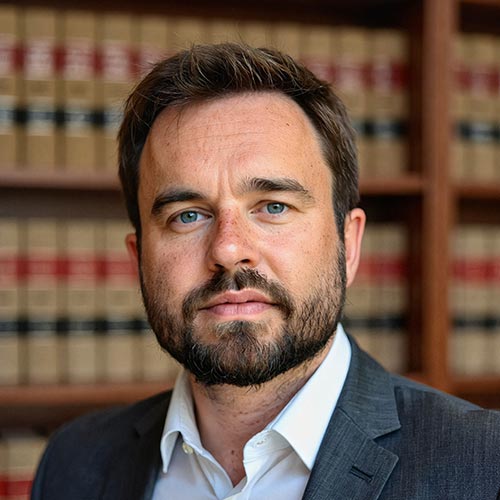
Dr Tom Smith is the Academic Director of the Royal Air Force College and an Associate Professor of International Relations at the University of Portsmouth, UK. He focuses on conflict and human rights in the Philippines and Southeast Asia. He has been a vocal critic of the Duterte regime and advised human rights groups in the region, working with civil society, UK government and overseas governments and NGOs.


